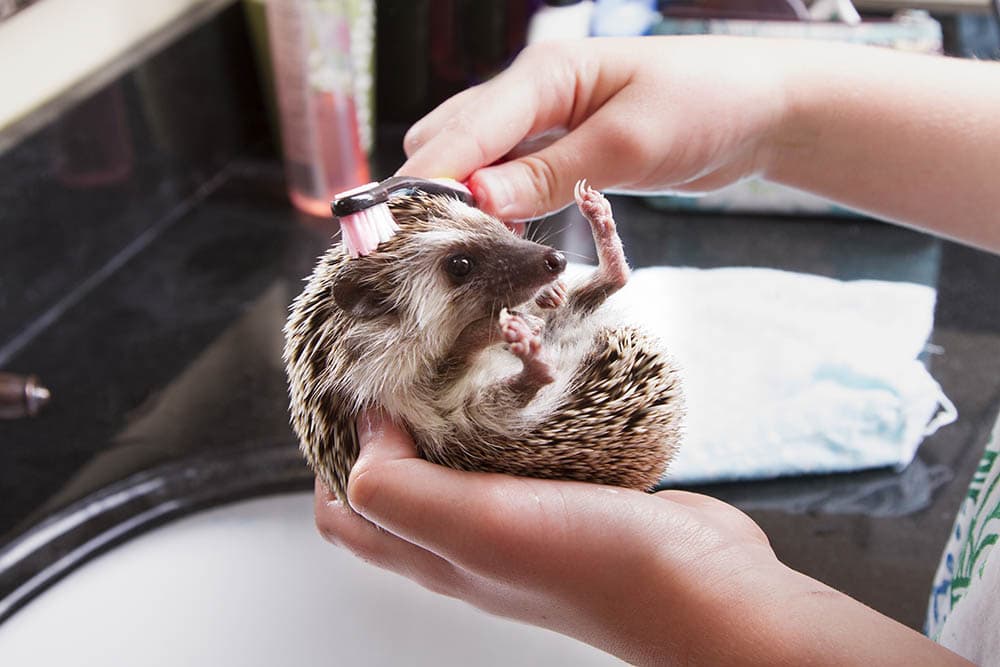
Hedgehogs are arguably one of the cutest domesticated cage animals you can find. They have adorable expressions, cute idiosyncrasies, and are generally pretty fun to watch.
Hedgehogs are solitary by nature, meaning they prefer to be alone in the wild. They tend to be a little shy when they are first introduced to their new owners. Because they don’t often like company, creating a partnership with your hedgehog may be a bit challenging at first.
As you’re learning all of their mannerisms, it can be hard to know what your hedgie is feeling. Understanding vocalizations is one of the primary ways to improve your relationship by listening to verbal cues in a language only they can speak.
A Few Hedgehog Pointers
If you were a new hedgie owner, it could be quite a learning experience trying to figure out their body language and communication cues. Hedgehogs can be quite finicky, so they are a little bit of a challenge for a novice owner.
Many hedgehog owners will agree that hedges are a ton of fun. However, they do enjoy their alone time and space. Learning as much as you can about this remarkable species will ensure that you can create a suitable habitat for them while respecting their boundaries.
While the hedgehog is generally peaceful, they can get very stressed out if handled too frequently.
This introverted creature prefers living alone, so it can be pretty challenging to form a relationship with owners. Often these are look-but-don’t-touch animals.
It’s much better to interact with your hedgehog by talking to it and giving it snacks instead of frequent handling.

The 8 Hedgehog Noises & Meanings
Looking to understand the hedgehog language? We’re here to help. Let’s get to the noises and what they mean.
1. Chirping
Chirping is often a sound you hear from baby hedgehogs when they are safe and cozy with their mother in the nest.
2. Dreaming
Do you notice your hedgie kicking and making adorable little noises while getting some shut-eye? They make all kinds of noises in their sleep, depending on what type of dream they’re having. Their body language, movement, and tone say a lot about that.
If your hedgehog is stressed out, you might notice that their movements are a little more intense—just like other mammals.
3. Hissing
If you hear hissing, you have done something to royally tick them off! They are incredibly annoyed with whatever is going on—as if you couldn’t tell by their flustered body language.
If they hiss, it’s a solid warning. You just need to step back and give them some space. If they are out of the enclosure, give them a second to cool down if you can. Once they seem to relax a bit, you may decide to approach them again, but only in order to put them back in their cage where they can continue to cool off.
4. Screaming
If you hear your hedgie screaming, pay full attention to the situation. They don’t call for no reason. Always assume it’s because they’re in trouble in one form or another, some hedgehog’s cage.
It just depends on the individual circumstances. If your hedgehog seems to be in unbearable pain and you can’t find the cause, seek emergency veterinary assistance right away.
5. Snoring
Is there anything more adorable than a snoring hedgehog? This is the sound you will hear when you’re a little guy fast asleep and enjoying his dream world.
6. Huffing
If you hear a hedgehog huffing, it can signal that they are trying to make themselves dominant. They often do this if they are unsure, anxious, or nervous about whatever is going on in their environment. They feel that if they make themselves bigger, the threat will, in turn, leave them alone.
They haven’t quite reached a level of teary-eyed rage that would create distress, but they are preparing themselves in the event of an attack by trying to be the dominant force.
7. Fear or Distress
If your hedgehog is fearful or distressed, they might make a very particular noise that signals something is wrong: they quack like a duck.
If you hear any of these noises, make sure to run to your hedgie right away, as they could be in some danger. It’s not going to be subtle. It’s sure to grab your attention.
Or, it might just be something in the environment that makes them upset. If that’s the case, you might try moving them to a quieter area so they can calm down and relax.
8. Coughing
There can be all kinds of coughing sounds your hedgie makes. Some coughs might be slight coughs on occasion to full-blown respiratory infections.
If you hear your hedgehog coughing, it could just be a regular occurrence as long as it is just on occasion. However, if you notice it’s happening more frequently, it’s usually signaling of the bedding being too dry in its environment. You could try using bedding that’s a bit more moist.
On the other hand, if it’s a severe cough, it can mean some infection is going on in their chest. If that’s the case, you might notice accompanying signs, like:
If you suspect an infection or parasite, don’t hesitate to locate an exotic vet and get your hedgehog in right away.
Conclusion
Hopefully, you have decoded a bit of what your hedgehog is trying to tell you. These creatures are a bit of a gamble because of their dispositions. If you notice that your hedgehog seems unhappy, try to look for triggers as to what might be causing the issue so you can create a better atmosphere.
If you notice that your hedgehog seems happy, on the other hand, you must be doing something right. You indeed are doing the correct thing by researching as much as you can about your chosen pet.
Featured Image Credit: Julia Jane, Shutterstock








